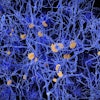Friday, December 1 | 11:20 a.m.-11:30 a.m. | SST01-06 | Room E450B
Researchers in New York have found that deep-learning networks can be trained with breast MRI data to predict Oncotype DX recurrence scores.Oncotype DX test results assign a recurrence score between 0 and 100 to cases of early-stage breast cancer or ductal carcinoma in situ (DCIS).
Dr. Jenika Karcich and colleagues at Columbia University studied 134 patients with invasive DCIS that was positive for the estrogen receptor (ER) and negative for human epidermal growth factor receptor 2 (HER2). All patients underwent breast MRI and Oncotype DX recurrence score evaluation. The team classified patients into three groups: low risk (recurrence score < 18), intermediate risk (recurrence score of 18-30), and high risk (recurrence score > 30).
The researchers used 107 of the cases (80%) to train the network and 27 cases (20%) to test it. They created two models: one for each Oncotype DX patient group (low, intermediate, and high risk) and one for a two-class prediction (the low-risk Oncotype DX score group compared with the intermediate- and high-risk groups).
How did the neural network perform? It achieved an overall accuracy of 80% in the three-class prediction model and 92% in the two-class prediction model, the researchers found.
"Current deep ... neural network architectures can be trained with relatively small MRI datasets to achieve useful performance at predicting Oncotype DX recurrence scores," they concluded.



.fFmgij6Hin.png?auto=compress%2Cformat&fit=crop&h=100&q=70&w=100)





.fFmgij6Hin.png?auto=compress%2Cformat&fit=crop&h=167&q=70&w=250)











